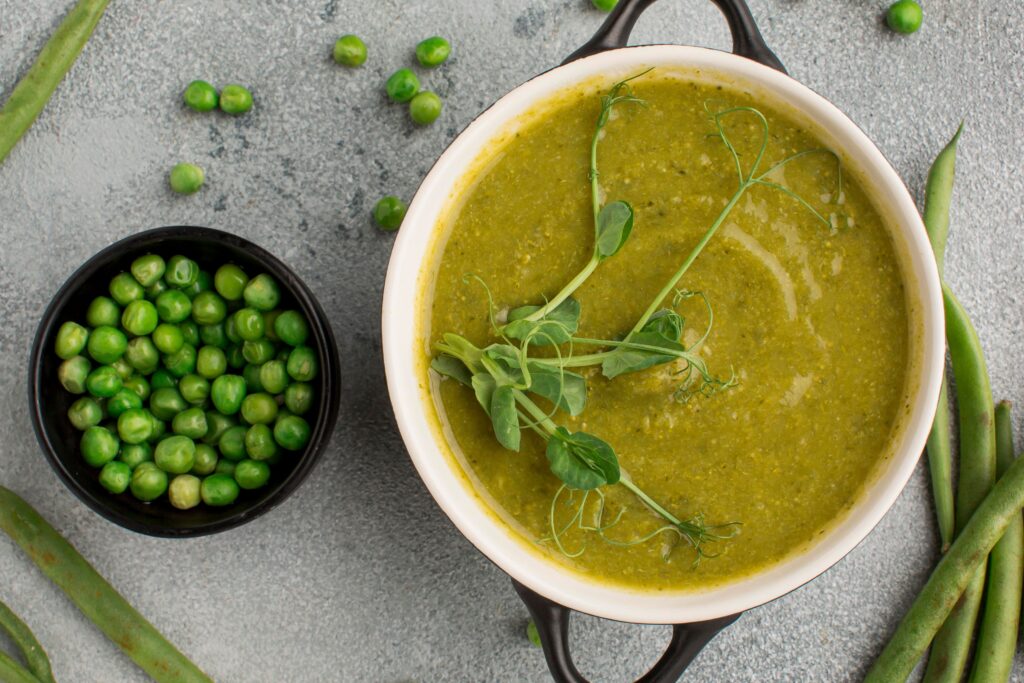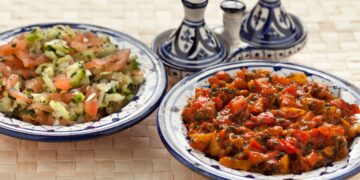As the crisp autumn breeze arrives, Moroccan kitchens fill with comforting aromas of spices, vegetables, and slow-simmered broths. Soups have always been an essential part of Moroccan cuisine, offering nourishment and warmth during cooler seasons. More than just food, they carry cultural traditions, family memories, and timeless recipes passed down through generations. This fall, Moroccan soups can provide both comfort and health while highlighting the rich flavors of the country’s culinary heritage.
Harira: Morocco’s Beloved Classic
No discussion of Moroccan soups is complete without mentioning harira. Traditionally enjoyed during Ramadan but equally loved in the fall, harira is a rich blend of tomatoes, lentils, chickpeas, and fresh herbs.
Light yet filling, it’s often served with dates or chebakia (sesame sweets). For Moroccans at home and abroad, a warm bowl of harira is a reminder of family gatherings and tradition.
Chorba Fassia: A Delicate Regional Favorite
From the historic city of Fez comes chorba fassia, a lighter alternative to harira. This soup features tender cuts of lamb, vermicelli, chickpeas, and fragrant spices like cinnamon and ginger. It’s often garnished with fresh coriander and served as a comforting family meal. Its delicate flavor makes it a perfect dish for chilly autumn evenings.
Vegetable Barley Soup: Wholesome and Hearty
As markets overflow with seasonal produce, Moroccan vegetable barley soup becomes a household staple. Packed with carrots, zucchini, pumpkin, and barley, it’s both hearty and nutritious. This soup is especially popular among families looking for a healthier, plant-based option. Barley adds a chewy texture while providing fiber, making it a balanced choice for fall wellness.
Building Business Partnerships Through Moroccan Cultural Events
In today’s interconnected world, businesses are constantly searching for innovative ways to establish trust, strengthen networks, and expand their reach....
Hiking Trails in the Middle Atlas Mountains
The Middle Atlas Mountains are often overshadowed by the High Atlas or the Rif, yet they hold some of Morocco’s...
From Passion to Profession: Turning Creative Skills into Income
In Morocco, more young people are transforming their creative talents into careers. Whether it’s photography, calligraphy, fashion design, or digital...
Young Moroccans Abroad: Balancing Wanderlust and Roots
For many young Moroccans, the dream of exploring the world is irresistible. Whether through study, work, or travel, living abroad...
Bissara: Simplicity at Its Best
In northern Morocco, bissara a thick fava bean soup, is a classic autumn and winter dish. Served with olive oil, cumin, and paprika, bissara is enjoyed with warm, crusty bread. It’s affordable, filling, and packed with protein, making it a traditional comfort food for early mornings or chilly nights. Street vendors often sell bissara in big steaming pots, reminding many Moroccans of childhood.

A Testimonial: Soups That Feel Like Home
Karim, a Moroccan living in Montreal, shares how soups keep him connected to home:
“Every fall, I miss Morocco’s warmth, but making harira and bissara brings me comfort. The smell of simmering lentils and spices makes my apartment feel like my mother’s kitchen. These soups aren’t just meals, they’re pieces of Morocco I can carry with me wherever I live.”
Modern Twists on Traditional Recipes
While classic recipes remain beloved, Moroccan cooks are also experimenting with new versions. Some replace lamb with chicken or fish, while others add quinoa or oats instead of barley. Even vegan adaptations of harira are becoming popular, showing how Moroccan soups can evolve with dietary preferences while staying true to their heritage. These modern variations prove that traditional dishes can remain relevant across generations.
Conclusion
Moroccan soups are more than seasonal comfort foods, they are cultural treasures. Whether it’s the richness of harira, the simplicity of bissara, or the heartiness of barley soup, each recipe tells a story of heritage, family, and warmth. This fall, trying these soups can be a way to nourish the body, celebrate Moroccan flavors, and create moments of togetherness at the table.
















Discussion about this post